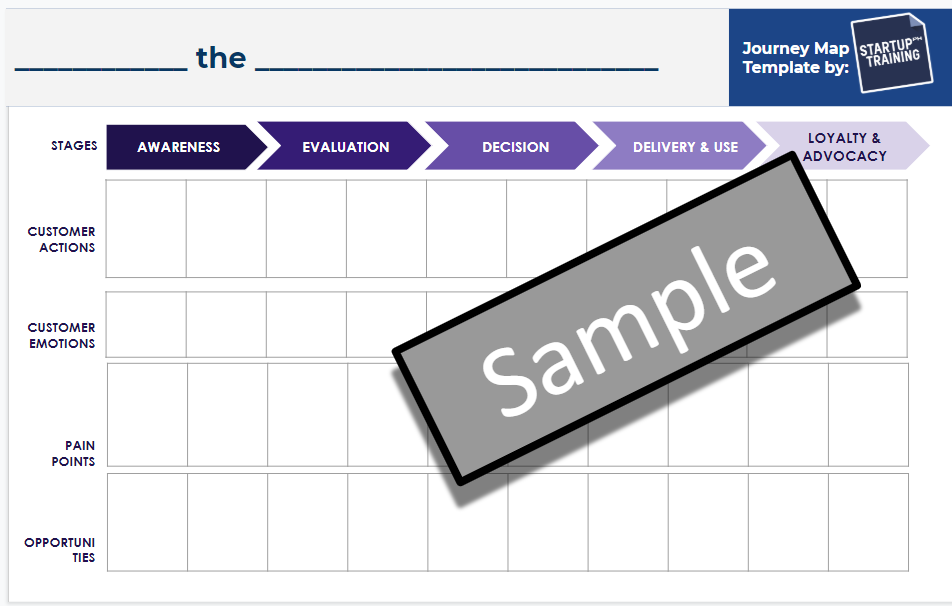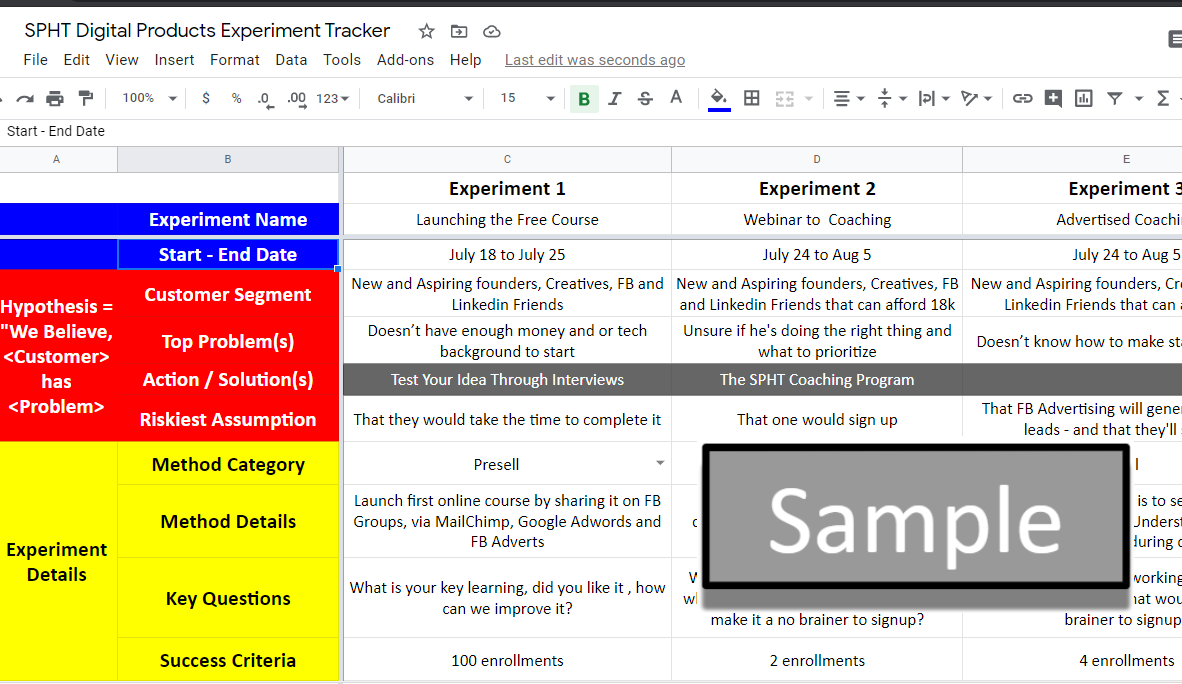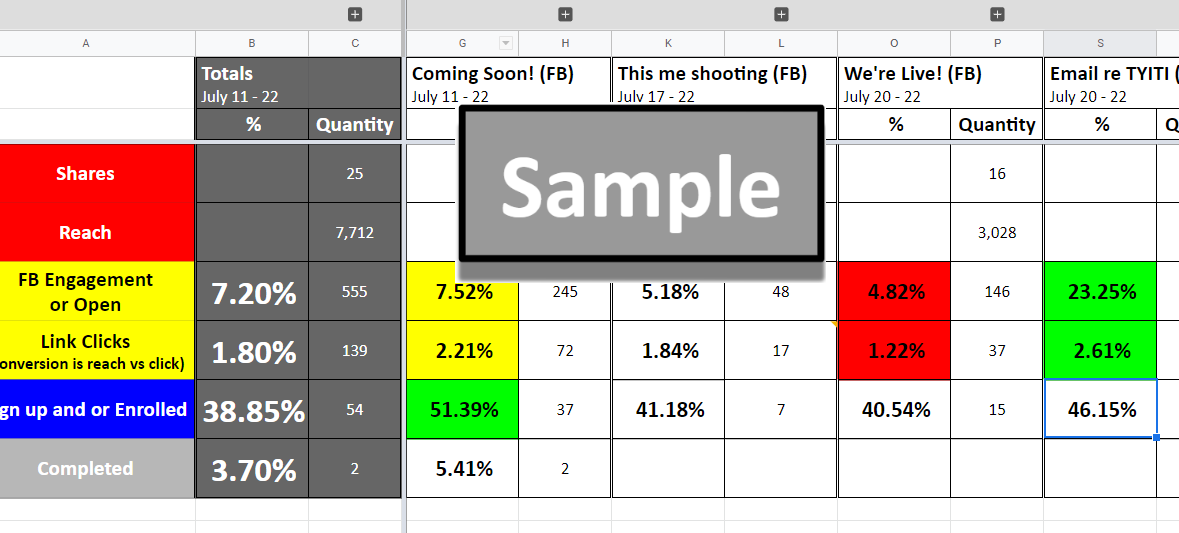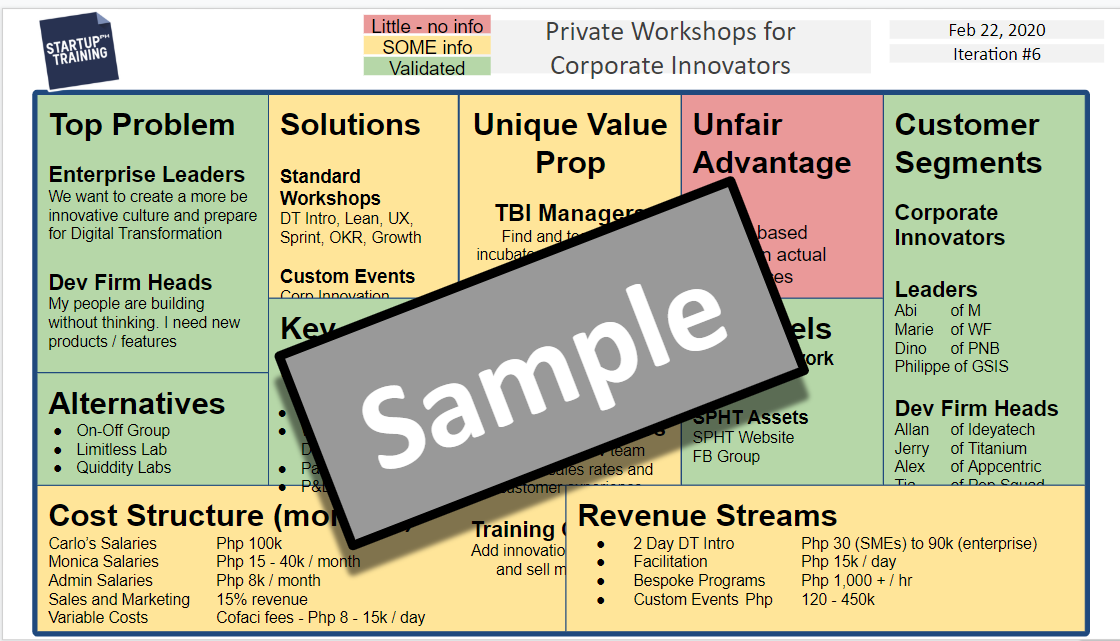Startup PH Training's Coaching Program
Turn your idea into a revenue generating startup using proven frameworks applied in the Philippine context
This highly practical, activity filled 8-week startup coaching program is designed for serious startup founders.
This program uses the best elements of Lean Startup, Design Thinking, and Agile frameworks. It is the result of years of experience initially as a startup founder and then as someone who has taught and coached hundreds of startup founders, students, and thousands of corporate innovators.
Confirm who your ideal customers are and really understand their goals, frustrations, values, behaviors, and sources of information
Find out what features really matter to them and how much they're willing to pay
Minimize your risk of failure by testing the assumptions that keep you up at night
Articulate your strategy through 1 page business plans.
Here’s a startup founder’s journey that I keep seeing play out time and again.
You come across a fantastic idea that nobody has thought of and you're convinced that pursuing this idea will dent the universe (or at least the industry it’s in), It will also transform the lives of the founders and of everybody else involved. So you start looking for a developer and maybe investors.
You hire a developer and start building the app and after a few hundred thousand (or millions of) pesos and several months, after endless debates with your co-founders of what should and shouldn't be included, you're ready to show the world what you've created. So you launch.
Then only a few sign up. And the few that sign up don’t understand and don’t use the app. You scramble and hustle your way to figure things out until you either run out of money or come to the painful realization that you've built something nobody needs.
In this course, we'll take it step by step from idea to real startup through a series of experiments to test your assumptions. We start from the riskiest until we get to your early adopters - also known as paying customers.
Week 1 - 2: Understand Your Customers and Find Problems Worth Solving (Weeks of Oct 12 and 19)

 Knowing the actions your customer takes and how they feel about each, lets you know how to give them a great experience
Knowing the actions your customer takes and how they feel about each, lets you know how to give them a great experience
Week 3 to 4: Testing and Iterating Solutions (Weeks of Oct 26 and Nov 2)
 Based on the Javelin Board and Lean Startup's Build-Measure-Learn framework. This tracker lets you to turn idea into an assumption, design and build an experiment to test it, run the experiment and measure the results. This is also where you keep your find all the key insights gained over time.
Based on the Javelin Board and Lean Startup's Build-Measure-Learn framework. This tracker lets you to turn idea into an assumption, design and build an experiment to test it, run the experiment and measure the results. This is also where you keep your find all the key insights gained over time.
Week 5 - 6: Find Your First Paying Customers (Weeks of Nov 9 and 16)
 The sales funnel measures how many are able to go from being made aware of your product, to considering it, to signing up then later on becoming a paying customer
The sales funnel measures how many are able to go from being made aware of your product, to considering it, to signing up then later on becoming a paying customer
Week 7 - 8: Prepare for Growth (Nov 23 and 30)
 This is a one page business plan and strategy document that takes an hour to get started and a few minutes each week to update.
This is a one page business plan and strategy document that takes an hour to get started and a few minutes each week to update.
Be an early adopter and early bird to get huge discounts!

Down payment is $180 or Php 9K




These mindsets are what successful innovators and entrepreneurs have. It's also what we hope to instill in you. For the full article check this link here
Find customers first before building anything
Don't make long term plans. Test your assumptions - starting from the riskiest
Everything is an experiment
Fail fast often AND ALWAYS forward










“We see pitches everyday and we feel that most have not validated their idea and have proceeded to create the product and that’s our main issue
Attending Carlo’s workshop prevents founders from just creating products and spending money. It also allows them to be more efficient with their products and ideas.
”
“You will always be part of my startup story, I tell people na I met you prior sa Final Pitch. Continue to be a blessing to others.
Tanda ko pa rin lahat ng mga naturo mo.
Thanks Carlo for everything!”
“Super important to determine ahead of time whether or not there is a market for your product. So getting input from your target audience, your target customer base on the assumptions that you’ve made is critical. Ultimately they are going to be the customers that will pay you.
If you don’t do it, you end up with a product with no customers.”
”
http://theleanstartup.com/principles
It’s aim is to shorten product development cycles and rapidly discover if a proposed business model is viable
This is achieved by adopting a combination of experimentation, iterative product releases, and validated learning.
Benefits of Using the Lean Startup Methodology
Eliminate Uncertainty
It isn't simply about spending less money or about failing fast, failing cheap.
It’s about putting a methodology around the development of new products
Work smarter not harder
The question that needs to be answered is not "Can this product be built?" Instead, the questions are "Should this product be built?"
Validated Learning
The unit of progress for Lean Startups is validated learning-a rigorous method for demonstrating progress when one is embedded in the soil of extreme uncertainty.
 As a mindset, Design Thinking prescribes that we don't need to make major investments in order to learn. We don't need to build and launch. We can simply go straight to learning until we get to the point that we are confident that we will build and launch is something that people will love.
As a mindset, Design Thinking prescribes that we don't need to make major investments in order to learn. We don't need to build and launch. We can simply go straight to learning until we get to the point that we are confident that we will build and launch is something that people will love.
The Design Thinking framework prescribes two mindsets.
Pillar # 1: Begin with Empathy. Understand the people you want to build for before you create or build any solution. Understand their goals, motivations, behaviors, journey, sources of information and most especially their frustrations. Understand without judgement and with lots of empathy.
Pillar # 2: Fail fast often and forward. Any IT professional knows that version 1 is never the final solution. Succeeding versions arise from the shortcomings of the earlier versions identified through feedback. So collect that feedback sooner not later and use the learning to rapidly iterate the solution.
Be an early adopter and and early bird to get huge discounts!

Down payment is $180 or Php 9K

If you have more questions, email me at [email protected]
To be clear, no. But it will give you a very good chance that it will. The focus of this course is to help you learn how to begin from a place of understanding and empathy, rapidly test your ideas, and design your solution based on what people are willing to pay for. There are other factors such as the idea itself, your drive or other things that compete for your attention as you are completing this course, and running your startup. Startups are hard and takes a lot of your time. Taking this course doesn't exempt you from the effort, passion, or time required. It does give you a road map and guide towards achieving success though.
That's totally fine though initially we won't be focusing on that, and I highly recommend you put a hold on it. Know that it's very difficult to be a solution looking for a problem.
We will be focusing on getting to know the people that could potentially be using it, understand their problems, and then see if what you've built is the best solution for it.
If not, then the good news is you've saved yourself from spending more money and time building something people don't need.
That's great! That's really critical at the very early stages of a startup. The focus will be on sustaining and growing your customer base. The fundamentals are actually the same regardless of stage (Begin by understanding, then prototype and test)
If you already have customers then we know who you need to talk to. Instead of finding out what problem we could potentially solve for them, we'll find out what problem you've been solving for them then get to know them even more. We'll understand how they feel about doing business with you and the areas that you can improve. By doing so, we'll keep them happy, keep and make sure they keep buying from us and also find more people like them to grow our startup.
If you have a startup idea and are willing to invest time into it to make this succeed. If there is a problem so big that it affects you so much and are passionate about solving it. If you are hoping to make this idea your full time career soon as you to afford it, if you are working with a team and have committed to each other to make it succeed, then this is for you. Even if you have a full time job but are committed to your idea, then this is for you.
A chapter will take about an hour to complete per week. In each chapter will need to complete activities you need (interviews, prototyping, creating pages, testing, reviewing, etc) which will probably take between a day or two. You will also need to set aside about a couple of hours worth of 1on1 coaching and meetings if you are working with a team. So overall perhaps about 2 to 3 days per week.
But the time you spend on the course shouldn't be separate from the time you spend on your startup. Remember that this coaching program is meant to guide you in your startup journey so that the time you spend completing the activities will be time spent on your startup.
In a nutshell, no. The beauty about 1on1 coaching is that we can arrange our schedule that we're both available. While a consistent schedule makes things convenient for me. I understand that this isn't always possible. Do note that starting August 26, I won't be available Wednesday mornings and anytime before 5pm on Fridays.
That might be a problem because business and startups are all about selling. Not just to your customers but also by selling your vision when recruiting your co-founders, your employees, and later on to investors and other customers.
The good news is that we don't sell to people that don't need our product or service. You won't need to do any convincing. If you do, then you're doing it wrong. People often associate selling with being that suave smooth talker that's trying to deceitfully convince us to buy something.
That's now what you're going to learn.
What you're going to learn is how to empathize with people, really understand them and match their problems with a solution to their problems and price it reasonably. Selling is problem solving. And if you like problem solving but don't like the old-school definition of selling, then this is your course.
This is a learn-by-doing type of course so if you do the activities that this course makes you do, then you will 100% learn a lot of things.
You risk not learning anything if you simply watch the videos and don't complete the prescribed activities and attend the 1on1 sessions.
If at anytime you don't feel that you are learning anything, let me know and I'm more than happy to give you your money back. All I ask is that you tell us what I could have done better.